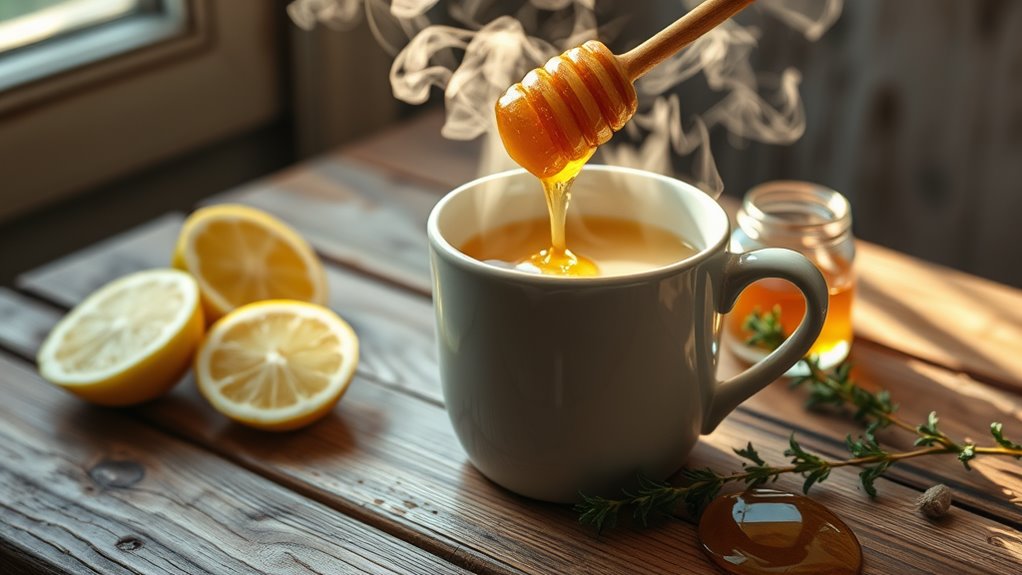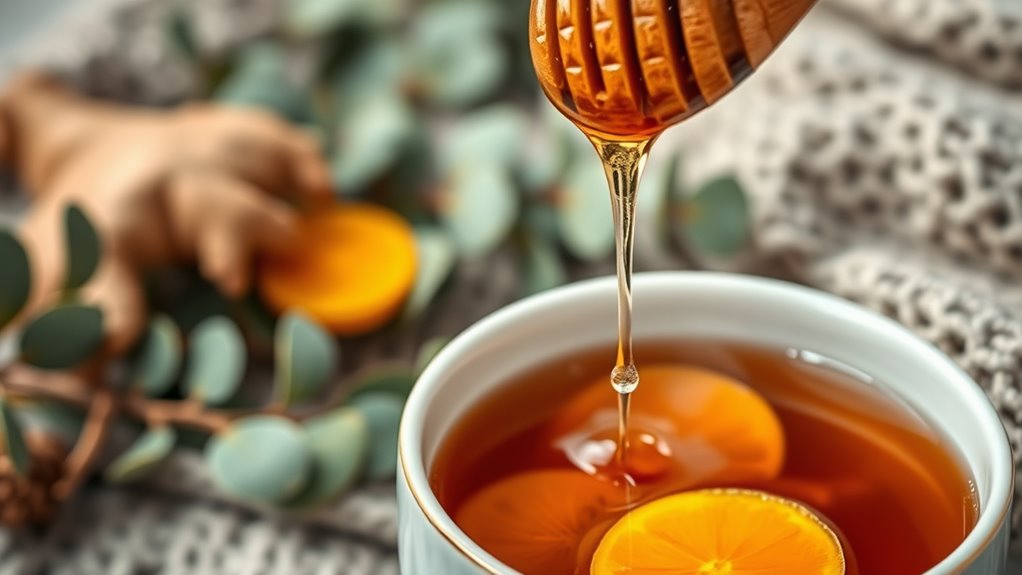Stop a Cough in Its Tracks With This One Simple Trick!
Pure honey is your natural secret weapon against stubborn coughs, often working better than over-the-counter medications. Take 2 teaspoons of raw honey before bedtime and again in the morning to coat your throat and calm inflammation. Its thick consistency, antimicrobial properties, and natural enzymes provide quick relief from coughing fits. For the most effective results, you’ll want to know exactly which type of honey to use and when to take it.
Why Honey Is Nature’s Cough Suppressant
While many people reach for over-the-counter cough medicines, honey has proven to be one of nature’s most effective remedies for suppressing coughs. Studies show that a spoonful of honey before bedtime can reduce nighttime coughing better than many commercial cough suppressants.
You’ll join countless others who’ve discovered this sweet solution that’s been used for generations. The thick, sticky consistency of honey helps coat and soothe your irritated throat, while its natural antimicrobial properties fight infection.
When you’re looking for natural cough remedies, honey’s unique combination of enzymes and compounds works to calm inflammation and reduce the urge to cough. You can take it straight from the spoon or mix it into warm tea for added comfort. Herbal teas can further enhance the soothing effects of honey when combined.
For best results, choose raw, unprocessed honey, which retains more of its beneficial properties. You’ll find it’s gentler on your system than synthetic alternatives and safer for children over age one.
The Science Behind Honey’s Healing Powers
Although scientists have long known about honey’s medicinal properties, recent research has revealed exactly how this natural remedy fights coughs and infections. When you consume honey, it creates a protective coating in your throat while releasing hydrogen peroxide, which naturally combats bacteria. The glucose oxidase enzyme in honey produces this antibacterial effect, making it particularly effective against respiratory infections.
You’ll be amazed to learn that honey contains over 200 compounds, including flavonoids and phenolic acids, that work together to reduce inflammation in your airways. These antioxidants help calm irritated throat tissue and suppress cough reflexes.
What’s more, honey’s high viscosity and hygroscopic nature mean it draws moisture from inflamed areas, helping to reduce swelling while soothing discomfort. Additionally, incorporating honey and ginger into your remedies can enhance its soothing effects and further ease irritation.
Just like your grandmother probably told you, honey’s natural sweetness also stimulates saliva production, which helps thin mucus and ease coughing – proving that sometimes the oldest remedies are backed by the best science.
How to Use Honey for Maximum Cough Relief
Understanding honey’s impressive healing properties is just part of the equation – knowing how to use it properly makes all the difference in fighting your cough.
Like many fellow cough sufferers, you’ll get the best results by taking 2 teaspoons of raw honey before bedtime and another 2 teaspoons first thing in the morning.
For an extra soothing effect, mix your honey with warm (not hot) water or herbal tea. Adding a squeeze of lemon enhances both the taste and the therapeutic benefits.
You can also create a powerful cough-fighting blend by stirring honey into chamomile tea with a pinch of cinnamon.
Remember to choose raw, unprocessed honey since it contains the most beneficial compounds.
Store your honey at room temperature and never add it to boiling liquids, as excessive heat can destroy its healing properties.
Many people find relief within just a few doses of this natural remedy, especially when combined with a balanced diet that supports overall immune health.
Best Types of Honey for Fighting Coughs
Choosing the right variety of honey can significantly boost its cough-fighting power. You’ll want to select pure, raw honey varieties that retain their natural enzymes and therapeutic properties. Dark-colored honey typically contains more antioxidants and beneficial compounds than lighter varieties.
| Honey Type | Healing Properties | Best Uses |
|---|---|---|
| Manuka | Highest antibacterial | Severe coughs |
| Buckwheat | Rich in antioxidants | Nighttime relief |
| Eucalyptus | Natural decongestant | Chest congestion |
| Local Raw | Region-specific benefits | Seasonal coughs |
For the most effective cough treatment, reach for Manuka honey with a high UMF rating (10+ or higher). If you can’t find Manuka, buckwheat honey makes an excellent alternative, especially when taken before bedtime. Eucalyptus honey works wonders for respiratory issues, while local raw honey helps build immunity against regional allergens that may trigger coughs. Natural kitchen remedies like honey mixed with warm water can also enhance the soothing effect of these honey varieties.
When to Take Honey for Quick Results
To get the fastest relief from your cough, timing your honey intake strategically throughout the day makes a significant difference.
You’ll want to take your first dose of honey first thing in the morning, before breakfast, when your throat might be irritated from nighttime coughing.
The most crucial time to take honey is right before bedtime, as this helps coat your throat and prevent nighttime coughing that can disrupt your sleep.
You can also take honey mid-afternoon if you’re experiencing persistent coughing throughout the day.
For maximum effectiveness, take 1-2 teaspoons of honey by itself and let it slowly coat your throat.
If you’re drinking it in tea, wait until it’s warm (not hot) to preserve honey’s beneficial properties.
Many people find success taking honey 30 minutes before meals, when their throat is most likely to be dry and irritated. Additionally, incorporating natural remedies alongside honey can enhance your recovery efforts.




